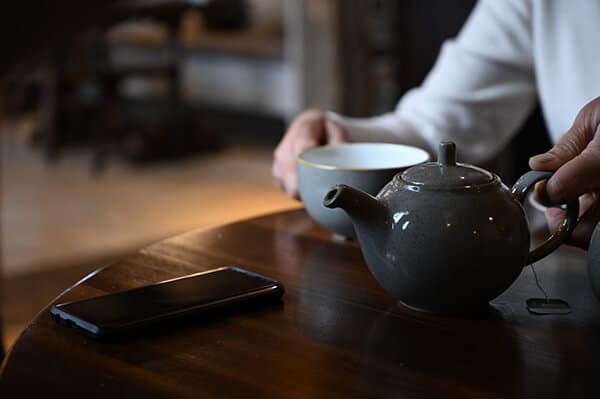Work life balance and daily life looks and feels different now that you’re self-isolating and practising social distancing during the COVID-19 (Coronavirus) Pandemic.
You’re doing your best to stay healthy in this difficult situation. Perhaps you count yourself lucky because you feel physically well and your work situation hasn’t been hit as hard as your friends. The first few days of the Coronavirus lockdown forced you to re-evaluate your eating and sleeping patterns. Now you’re trying to re-set your body by resting more and eating three healthy meals a day. However, being ‘cooped up’ inside all the time can be challenging in many other ways.
Maybe you’re going out less or not at all. Maybe you’re working from home and you’re not used to it. Sitting in front of your computer, hour after hour can be tiring and draining. Staying inside your room on the weekend may feel strange. Even though you’re keeping busy and your family and friends are in-reach, you can still feel lonely. You may feel bored, frustrated or sad because your Saturday night feels the same as your Tuesday evening. Dipping into work when you’re not supposed to may be tempting when it becomes more interesting than doing nothing.
Coronavirus Isolation and its Impact on Your Mental Health

Social isolation can slowly eat away at your mental health. Even if your physical health or finances haven’t been greatly impacted by COVID-19, you can still experience anxiety, grief and loneliness. When your day-to-day and weekly routines are suddenly disrupted, this in itself can be a shock to the system. What was familiar and normal kept you mentally grounded.
Along with this, you may find yourself craving all the simple human interactions you usually have with your neighbour or coffee guy at your local cafe. Exchanging a smile, glance or conversation about the weather is missing from your daily experience. With ‘cabin fever’ setting in, you realise you’re not coping so well – mentally.
With all this alone time, uncomfortable thoughts and feelings may come to the surface. So it’s understandable to want to fill your time with work if it feels like a good distraction. Yet you’re mindful to not let work take over and disrupt the balance that you’ve been trying to create for yourself and your family. More than ever, you want to feel “normal” especially at this time. Your struggle to find work-life balance is real.
Manage Stress, Embrace Work-Life Balance and Prevent Burnout When Working From Home During COVID-19
Creating healthy work routines and habits make it possible to achieve work-life balance when working from home. When you are intentional with your actions and clear about what’s work and what’s home, you can begin to feel more in control. Yes, it is possible to manage your stress successfully amid a global pandemic!
Top 10 Things You Can Do Now in Your Routines for Good Work-Life Balance
With so much happening under one roof, and nowhere else to go, it can feel too much. You want to find your focus and keep out unnecessary stress. Below is a list of practical things you can do right now at this time of uncertainty to feel less stressed, more in control and more at peace.
1. Separate your work space from your home space.
Your work space is now inside your home space. That can’t be helped. However, you can dedicate a specific space within your home to do your work. As long as this space is not the same place where you would normally eat or rest. Don’t bring your laptop to bed or start checking your e-mails on your phone at the breakfast table. If you allow work to bleed into other areas of your private home space, you are likely to be reminded of work when you’re meant to be resting and mentally switching off from work.
2. Wear your work clothes when working from home.
It’s tempting to stay in your pyjamas all day if you don’t need to face anyone from work. You may even go as far as keeping your top half presentable whilst wearing your joggers and slippers – if you need to attend a video meeting. Being comfortable is important. But to feel alert and ready for work, wear your work clothes instead of your home clothes. Like putting on a costume, it can help you get into your role and be in the necessary frame of mind. Then, when it’s time to stop work, you can literally take off your work clothes and physically peel away the day’s stress.
3. Meditate at the start and end of your working day.
Take 5-10 minutes to mentally transition or commute from being at home to being at work. To do this at the beginning of the day, sit comfortably and upright in your chair at your designated work space. Close your eyes and visualise yourself getting ready for work. In your mind’s eye, visually walk through your morning routine and travel journey from your home to work. Once you have mentally arrived at your office, open your eyes and begin your work day. Reverse this at the end of the day once you’ve attended your last meeting and checked out of your e-mail. In the same chair, close your eyes and imagine yourself travelling back from work to home. At this point, ensure that everything you do in the day relates to your home life. Meditating by visualising in this way can help you focus and create further separation between your work and personal life.
4. Meet with a friend or colleague over a virtual tea or coffee break.

When you next have a tea or coffee break, consider doing this virtually with a friend or colleague. Even if it’s for 15-30 minutes. Connecting and being with someone when you’re taking your break can be refreshing and invigorating. Try making a conscious effort to separate yourself from work by engaging in something social.
If you decide to take a virtual break with a colleague, agree to talk about non-work related matters. Otherwise, your break may end up feeling more like a work meeting than an actual break away from work. A break should feel like a break!
5. Stick to your timings.
Decide on your working day’s start time and end time, and stick to these timings! It can feel too easy to start late and end late. You may even forget to take a break because it feels convenient for you to eat something quickly at your desk. To feel less tired and more energised, create some basic rules around your work schedule. It’s important to make a conscious effort to take a break especially for lunch, and more frequent and shorter 5 minute breaks especially if you find yourself in front of your computer for long periods of time.
6. Separate your weekdays from your weekends.
When every day feels like groundhog day, it’s hard to distinguish what day is what. It may also feel difficult to enjoy your weekend when every day feels the same. It’s important to distinguish your work week from your weekend so you can feel that healthy separation. What do you think you can do to get back that Friday feeling? To celebrate your week of hard work and achievements? And to take some proper time off to rest and play? Brainstorm a list of new hobbies or personal projects you would like to start. Perhaps there are even a few things you’ve started in the past where you would like to finish. You can enjoy this on your own or share this with others who share your interests.
7. Get an accountability partner or join an accountability group.
It’s hard to feel motivated when you’re on your own. You may find yourself procrastinating. Unable to do your best work. Perhaps your mind wanders elsewhere and you find yourself dipping in and out of reading the news or checking your social media feed. To feel accountable and responsible, sometimes you need to feel the presence of someone else, to help you focus on your work. Arrange an hour or two with a friend or colleagues on video conferencing. Instead of talking, you’re working in silence together. Create some key rules as if you were together in a co-working office: work quietly, turn off your notifications and switch your phone to silent. When everyone around you works with the same respect, dedication, and intention to get stuff done, you’ll feed off each other’s energy and feel more committed to staying on task too.
8. Take frequent breaks for more work-life balance.
Take more breaks than usual. Give your eyes a rest. Get up and stretch. Drink some water. Have a healthy snack. Listen to your favourite song and dance. Go to a different room. Lie down and do some breathing exercises. Whatever you choose to do, do something different and away from your computer or work area. More importantly, listen carefully to your body. In practice, this means being mindful of booking and accepting back-to-back meetings. Your body will thank you for your care and attention.
9. Limit the news and social media.
If checking the news on the hour isn’t the norm for you, then limit the number of times you read the news and the articles you choose to read. If your family and friends share content with you that you feel is too disturbing or distracting, it’s okay to make them aware of how you’re feeling about the news and voice how you would like them to help you. You have the power to decide what you let in and what you keep out.
10. Share, share, share.
It’s okay to feel what you feel. There are many people around you who may feel exactly what you feel. You don’t need to hold it all on your own. If what’s going on in the world and in your personal life takes over, give yourself some space to breathe and slow down. Give yourself permission to not be on top of things. Go easy on yourself and let go of your expectations. It’s okay to break away from routines, be totally spontaneous and respond to your immediate needs – in the moment. If you need to switch off from work so you can chat to a loved one on messenger because you need the connection and support, then go for it. Sometimes speaking on the phone with a friend may be just what you need. Be kind and gentle with yourself. Work can always wait.

Begin Online Therapy in London and UK Wide
Work-life balance is important for everyone. Especially for busy people, like first responders and helping professionals, who need someone who understands. Someone who is able to both help and support from a place of empathy. That’s where I come in. One of my counselling specialties is dramatherapy for adults. You may be doubting your role. Or, wondering how you fit into the bigger picture when bad things keep happening in our world. Perhaps, you recognise the way your job is affecting your family. Maybe you just don’t think therapy can work for you. Whatever your reasons for reading this are, if you’re a first responder, I can help you. To learn more about online therapy in London, or anywhere in the UK, visit my online counselling page.
You do not have to feel scared and alone all on your own.
When you are ready to take control of your life, I am ready to help you. You deserve healing from your PTSD symptoms, hope about the future and to have healthy relationships moving forward. I am a trauma counsellor with therapy offices in Angel and Farringdon. I would also love to help you find healing through online trauma therapy in London. If you are ready to let go of your stress, manage your daily anxieties, and feel more connected with your loved ones, I can help.
Let’s get started with a free 20-minute therapy consultation over the phone. I look forward to speaking with you very soon!
________________________________________
If you have any requests for a blog post, please feel free to send your questions, comments or ideas to: jamie@ytherapy.com
Please note that this blog is meant to be educational and should not be a substitute for therapy.
If you would like to enquire about stress and burnout therapy, please contact me or book an appointment: https://ytherapy.com/book-an-appointment/

